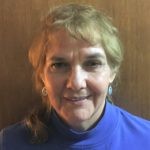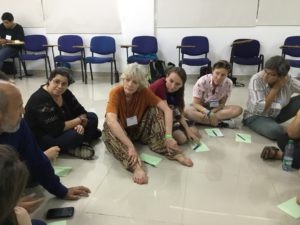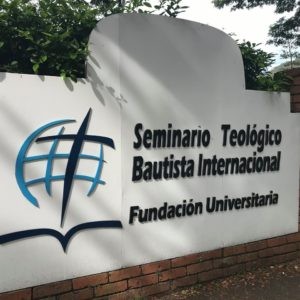 I went to an international conference on peace and peacemaking. It was hardly a walk in the park.
I went to an international conference on peace and peacemaking. It was hardly a walk in the park.
The recent Global Baptist Peace Conference in Cali, Colombia, was intense, even excruciating.
It was also life-giving.
On the conference’s first full day I had breakfast with Eleazar Ziherambere, who lived in Rwanda in 1994, when some 800,000 people were slaughtered by their own countrymen in a matter of 100 days. He is now retired as the regional director for American Baptist Churches USA missions in Africa.
During that summer of terror, “I stopped asking for God to spare my life,” Ziherambere told me. “I began to pray, ‘When they kill me, please let it be quick.’” Even after 25 years, the pain in his voice was still evident.
“‘There is so much pain in this room.’”
After breakfast, I walked to the campus of the Unibautista Theological Seminary where we heard from two women from both sides of the brutal, decades-long civil war between the Colombian government and the Revolutionary Armed Forces of Colombia (FARC), among other groups. Fabiola Perdomo’s husband was kidnapped and killed in 2002, along with several other politicians, by FARC guerrillas.

Members of BPFNA~Bautistas por la Paz who were present met one afternoon during the conference for an update on the organization’s work. (Photo/Charlene Kelley)
During the panel discussion, Perdomo sat next to Victoria Sandino, now a representative of the FARC party in the Colombian legislature. (Sandino had arrived, by the way, with two armed guards.)
Sandino apologized profoundly for what the guerillas did to Perdomo’s husband and asked for forgiveness. For her part, Perdomo described the agonizingly long process of working through her grief and rage to reach a place of healing.
Then she turned to Sandino. “I do forgive you,” she said. “I can forgive now.” And, she added, she believes she can also forgive her husband’s killers.
After that emotional panel discussion, we heard from Colombian pastors and other church leaders whose villages were scenes of atrocities and mass murders. They spoke of the ways they have tried to cope with the loss of so many family members and neighbors.
And all of that was before lunch.
“My kids said, ‘Mom, how can you teach us our entire lives to follow the teachings of Jesus and now want to leave when the people need you most?’”
Some 375 people from 30 countries on six continents gathered in Cali. The annual conference was sponsored by American Baptist Churches International Ministries, Unibautista BPFNA ~ Bautistas por la Paz, the Alliance of Baptists and the Cooperative Baptist Fellowship.
Every participant is working in their country to create a just and peaceful society. It is exhausting and often discouraging work, so these people of faith came together to share stories and ideas. They came to be reminded they are not alone. They came to give and receive hope.
Throughout the week, we heard hard but inspiring stories from amazing people. To name but a few:

The Global Baptist Peace Conference took place July 12-22 at the Unibautista Theological Seminary in Cali, Colombia. (Photo/Jason Smith).
- Boaz Keibarak, a mediator between warring tribes and villages in Kenya.
- Rusudan Gotsiridze, whose country, Georgia, even now struggles against Russian aggression, and whose Evangelical Baptist Church of Georgia stands virtually alone on issues of hunger, justice for the LGBTQ community and interfaith reconciliation. “We decided we can do what is easy, or we can do what is right,” she said.
- Ray Schellenger is global consultant on immigrants and refugees for ABCUSA’s International Ministries. He works extensively in Tijuana on the U.S.-Mexico border.
- Philip Kakungulu founded a church that is welcoming and affirming to the LGBTQ community in Uganda, where it is illegal to be homosexual and killers of gay persons go unpunished.
- Lance Muteyo does conflict transformation training in his native Zimbabwe, a country in utter turmoil. He is tireless in organizing for peace in Africa. After Muteyo’s workshop on structural violence in African elections, one person remarked, “He should never go anywhere without bodyguards!”
- Manal El Tayar sponsors regular dialogue between Christian and Muslim youth in Lebanon, a country still profoundly affected by the Christian-Muslim war from 1975 to 1990.
- Laura Parajón, an American Baptist medical missionary for the Amos Project in Nicaragua, chose to stay in the midst of the deadliest conflict in that country since its civil war ended 18 years ago. She told the assembly, “I was scared for the safety of my family. I wanted to leave the country. But my kids said, ‘Mom, how can you teach us our entire lives to follow the teachings of Jesus and now want to leave when the people need you most?’ So we’re still there.”
- Francesca Nuzzolese, a teacher and pastoral psychotherapist from Italy, works every day to find ways to stop sex trafficking.
- The Australian Baptist Association and Baptists from Myanmar described their partnership to help Karin refugees who fled Myanmar to refugee camps in Thailand.
The list could go on and on.
“Worship not only eased the pain but infused the experience with joy.”
At times the stories were too overwhelming to comprehend fully and almost unbearable to hear. “There is so much pain in this room,” acknowledged Ruth Mooney, who has served as an American Baptist missionary in Costa Rica, El Salvador and Cuba.
Worship not only eased the pain but infused the experience with joy. Multicultural worship included Taize, South American hip hop and rousing African chants, along with prayers and scripture reading in at least 10 languages.
What also made the shared experience bearable was the affirmation that Baptist Christians from all over the world have found ways to bring about change in their local and national contexts — and that they are not about to give up.
That creates hope. Not a cheap, shallow hope, but, as Ken Sehested, founding director of the Baptist Peace Fellowship of North America, said, the kind “you can only have when your back is against the wall.”
The struggle for peace in places of violence around the world will continue. But those of us who gathered for a week in Columbia know that we are all in this work together. We are not alone.
Note: This commentary was updated July 30 to include American Baptist Churches International Ministries as a conference sponsor.
